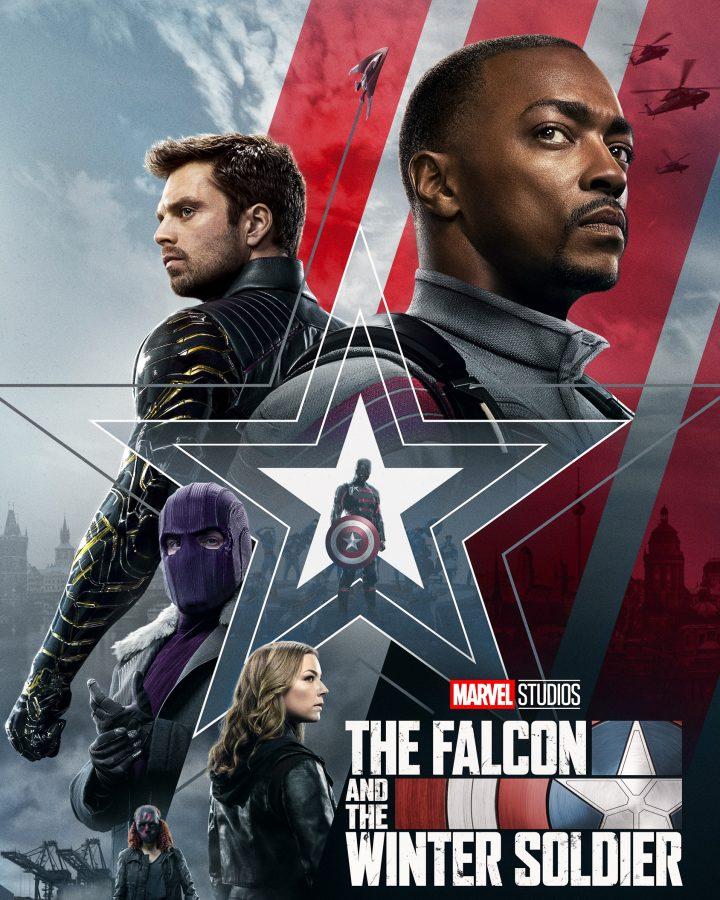Hot off of the success of “WandaVision,” all eyes were on Marvel Studios’s next big project. So, when “The Falcon and the Winter Soldier” dropped its first episode two weeks after “WandaVision’s” finale, expectations were high. The new show quickly revealed itself to be a completely different project, as its focus was less on surprising plot twists and magic and more on current events and social commentary. The story centered on the Falcon, recently offered the role of Captain America, turning it down and giving Cap’s iconic shield to a museum. Bucky, AKA the Winter Soldier, is finally settling down after fighting—whether as a soldier or a brainwashed assassin—for decades. When the government gives the title of Captain America to John Walker, who quickly proves himself unworthy of the title, the three team up to take down a terrorist group known as the Flag Smashers. So, now that all six episodes have been released on Disney+, did the show work well with this different tone?
With all of the discussion around America’s racist history in “The Falcon and the Winter Soldier,” it may surprise many that the show initially started filming before the Black Lives Matter protests last summer. It would be easy to say that this is the result of some supernatural precognition, claiming that Marvel accidentally stumbled onto what would soon be a national conversation. However, Marvel, unlike their characters, has no superpowers. Whether people were aware of racial injustice before 2020 or not, it was still a reality for millions of people in this country. The show reflects this with the character Isaiah Bradley. As a Black super soldier who fought in the Korean War, he experienced a completely different reality from Steve Rogers (the original Captain America). In the show’s fifth episode, “Truth,” Bradley talks about freeing his fellow soldiers from a POW camp. When he did this, he was imprisoned by the U.S. government and tortured. Longtime Marvel Cinematic Universe fans know that this is a nearly identical version of Steve Roger’s first mission. Where Steve was celebrated, even though he disobeyed orders, Isaiah was punished.
This story plays a large role in Sam Wilson’s (The Falcon) decision over whether or not he should become the next Captain America. As he states in the show’s finale, he knows that every time he puts on the costume, millions of people in the country he is fighting for will hate him for it. However, Sam chooses to represent the ideals of the United States instead of its reality. Where Isaiah Bradley’s history was completely erased, Sam chooses to be a symbol that cannot be ignored.
More than that, Sam Wilson is just a perfect choice for Captain America. It is hard to imagine any other character in the MCU that could give a speech as good as the one Sam gave in the show’s finale. He truly wants to see people help other people. He shares the same empathy that his predecessor had.
As for the Winter Soldier, Bucky’s arc was less about the dark reality of the United States as a whole, and more about the specific experience of a veteran. While Bucky did not have the typical experiences of a soldier, his haunting memories of fighting for something greater than himself and the sacrifices he had to make echo them. He wakes up from nightmares in which he has to relive his past trauma. His guilt over his actions is reflected in John Walker’s conversation with Lemar Hoskins (John’s partner) in “The Whole World is Watching.” John says that despite being heralded as a hero by his country, he still feels that some of the things he did in war were not heroic. Bucky’s decision to atone, and not avenge, is what leads to the beginning of his healing.
John Walker’s arc on the other hand was… not as well done. I thought that the character was tremendously handled for the first five episodes, but having his redemption come so easily just didn’t feel right. His brutal killing of a Flag Smasher was made to resemble the many filmed instances of police brutality, so to tie him with a real issue and then have him be forgiven by everyone so quickly felt wrong. Sharon Carter also didn’t have the best character work in this show, but it is clear that the studio has more to reveal with her. Until we get the full picture, I won’t be too quick to judge.
So, while there were certainly some flaws, I think that “The Falcon and the Winter Soldier” is worth watching. It’s fun, relevant, and filled with great character development; you could certainly do far worse.

